Training My Friend to Cook
post by lsusr · 2021-08-29T05:54:50.065Z · LW · GW · 33 commentsContents
Takeaways Snafu None 33 comments
During pre-vaccination covid, my friend Brittany and I agreed to hang out once per week as quarantine buddies. Brittany has a laundry list of health problems, many of which are exacerbated by a poor diet. Brittany loves healthy food. She ate a diet based around TV dinners because she didn't know how to cook. My goal for covid lockdown was to train Brittany to cook.
It was summer. I started out by picnicing in the park together. I brought rice, beans, sauerkraut, sliced radishes, homegrown tomatoes, tortilla chips and homemade salsa. Though simple, the food I made was far tastier than anything Brittany was eating. It's not hard for fresh homemade food to beat TV dinners. After each picnic I'd send the leftovers home with her in lovely glass jars. This associated "homemade food" with sunshine, verdant trees, picnic tables and quality time with good friends.
I talked about how cheap it was to make food when your primary ingredients are rice, cabbage, onions and dried beans. This made an impact because Brittany was regularly paying $15 per meal for her TV dinners, a far inferior food. I never said "you should cook" because that would make Brittany feel bad for not cooking. I just talked about how great it was that I could cook. I showed her an ambition she could aspire to.
Brittany is a med student with very limited time. Going to a park takes time. Have already established the "homemade food" = "warm verdant picturesque parks" association, we moved our hangouts to her apartment. I brought the ingredients to her apartment and cooked them there. She insisted on splitting the grocery bill. A single night of my cooking would give her days of good food for the price of a single TV dinner.
Though I always provided Brittany with leftovers, I also made sure that they never lasted more than a few days. Brittany would eat delicious food for a few days and then she'd be back to her TV dinners. Brittany looked forward to our hangouts.
Brittany is Taiwanese and loves healthy food. I upgraded rice and beans to her favorite foods. I sautéed bok choy. I blanched Chinese broccoli. I figured out a mild mapo dofu. I learned how to prepare 絲瓜. After Brittany had watched me sauté vegetables a few times I encouraged her take over. I made a big show of how I got to relax while she did the cooking.
One day Brittany ordered a box of meal kits. I gently, but stubbornly, refused to help her with them. I walked her to her nearby grocery store where we bought groceries together. I guided her through sautéing onions. Eventually she was cooking all of her favorite dishes.
I worried that I had conditioned Brittany to cook solely when I came over. Suddenly, mid-week between our hangouts, she sent me these photos.
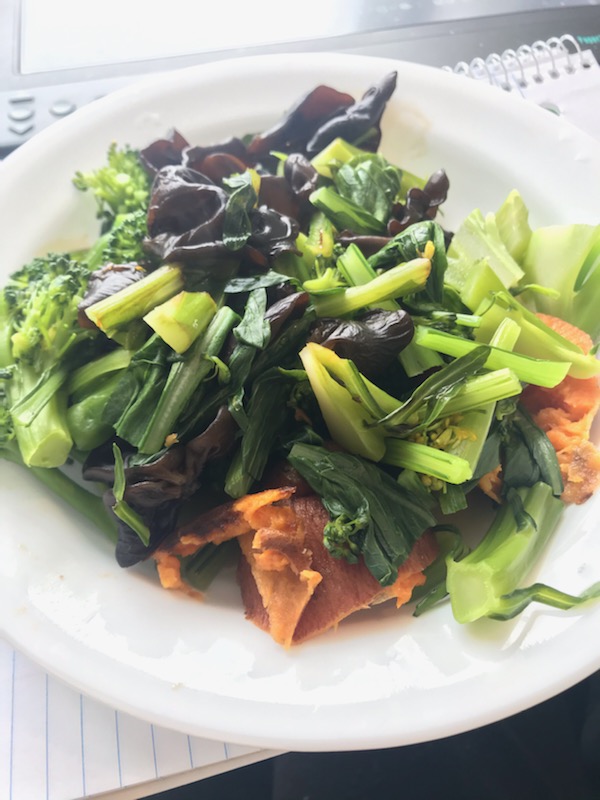
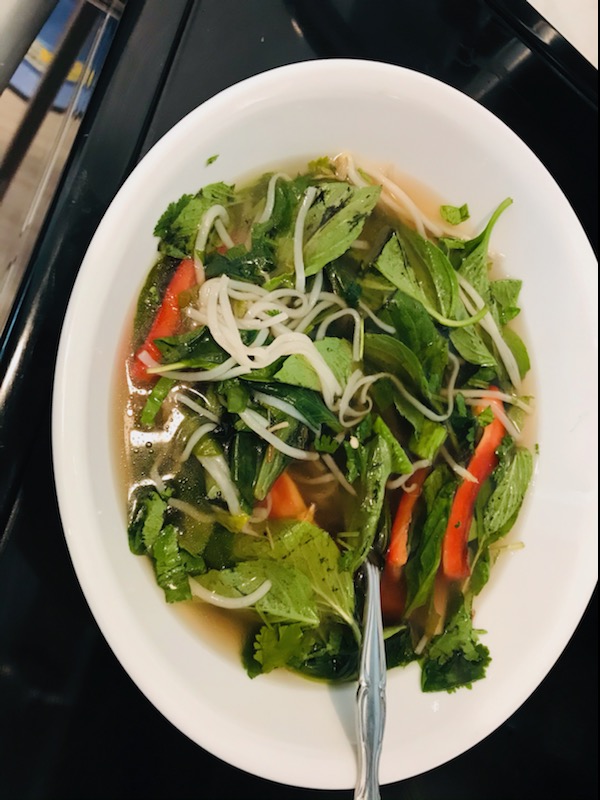
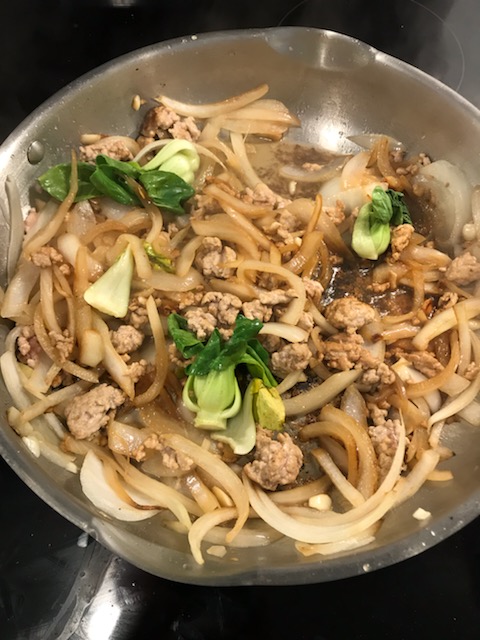
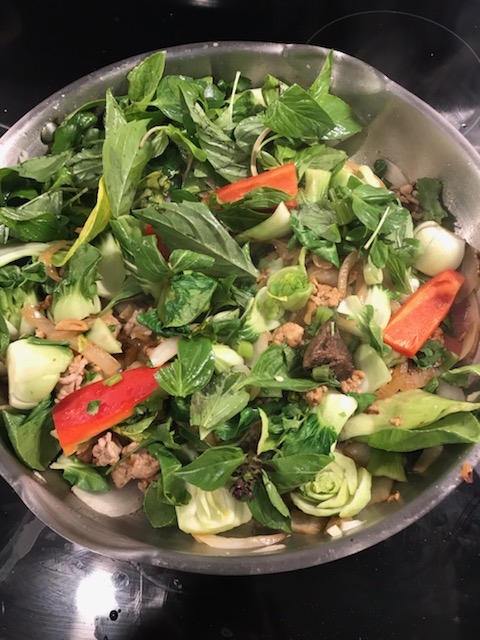

I cooked them on my own time based off of memory and our notes 📝 with no help !!!! you really really really helped me!!! You really are the best.
Can't wait to practice more dish!!! Haha 😛 life quality is seriously improving 😭
Really proud to share these photos.
Aww. Weeks later, she followed it up with another message.
You put me on a habit roll to walk straight to the grocery store and cook lol

These days I can give her my extra veggies and she will blanch them.
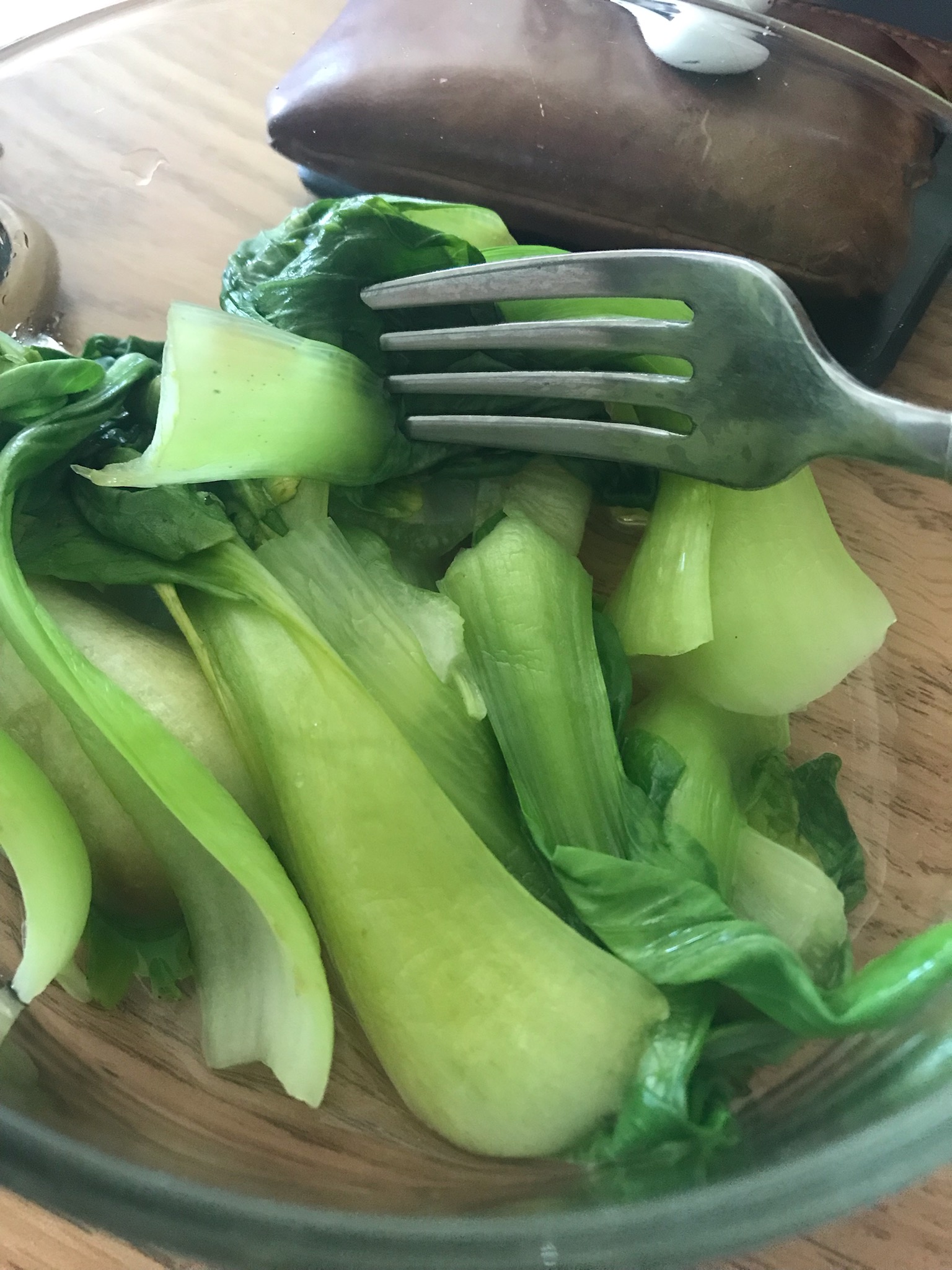
Takeaways
Changing your own long-term behavior is hard. Changing someone else's is even harder. It is easy to do more harm than good. To make sure I actually did good, I employed protocols from Don't Shoot the Dog [LW · GW] by Karen Prior.
- The most important protocol I used was strictly positive reinforcement. I never, at any point, implied that Brittany might be deficient because she didn't know how to cook. I didn't even imply she "should" cook. I always framed the activity as "isn't this an exciting opportunity to viscerally improve your life"? Brittany never associated cooking with anything unpleasant. To this day, the activity is solely associated with reward.
- The second most important protocol I used was backchaining. I didn't start by bringing Brittany to the store, then teach her to cook and have her eat at the end. I started by feeding her, then I taught her to cook and only at the end did I bring her to the grocery store. If I started by bringing her to the grocery store then she wouldn't understand why we were buying what we were buying. But when I started by serving her food in a park all she had to understand is "eat delicious food". At every point in the process, Brittany understood exactly how the thing she was doing connected to "eating delicious food on a summer day under green trees".
- I let Brittany watch me perform a skill a few times over a few weeks before having her do it herself. I never told her to read anything. Monkey see. Monkey do.
Snafu
Right after Brittany learned to sauté, I made a big deal about how she "could sauté any vegetable". She sautéed asparagus. (You should not sauté asparagus.) I didn't mean that she could literally sauté any vegetable. By "any vegetable", I meant she could sauté any vegetable that experienced cooks know is something you should sauté. I laughed it off and took responsibility for giving bad instructions. I explained how I often messed things up too and made sure to complement her initiative.
33 comments
Comments sorted by top scores.
comment by dumky · 2021-08-29T16:03:23.240Z · LW(p) · GW(p)
Pretty cool experience, but I have to say this rang some alarm bells for me: "My goal for covid lockdown was to train Brittany to cook.".
What did she want?
But it sounds like she was onboard, or at least ended up appreciating the training and assistance :-)
comment by Neel Nanda (neel-nanda-1) · 2021-08-31T16:52:15.557Z · LW(p) · GW(p)
Strongly downvoted. It sounds like the end result here was good, but I feel extremely uncomfortable with the manipulative undertones and lack of agency given to your friend throughout all this. Did she consent to any of this before you started the project, and did you explain to her how you intend to change her motivation system around cooking before trying this? This is an extremely important detail which I didn't see mentioned - I think you should only try to fix other people's lives if they explicitly ask you to.
Replies from: Kaj_Sotala↑ comment by Kaj_Sotala · 2021-09-01T12:29:10.322Z · LW(p) · GW(p)
Did she consent to any of this
Didn't lsusr already answer this in the positive [1 [LW(p) · GW(p)], 2 [LW(p) · GW(p)]]?
Replies from: lsusr, neel-nanda-1↑ comment by Neel Nanda (neel-nanda-1) · 2021-09-01T17:05:52.176Z · LW(p) · GW(p)
As far as I can tell, those comments say "she was enthusiastic about learning how to cook", not "she was enthusiastic for me manipulating her into being intrinsically excited about cooking". I think there's a very important difference
Replies from: Kaj_Sotala↑ comment by Kaj_Sotala · 2021-09-01T18:05:29.897Z · LW(p) · GW(p)
Are you suggesting that she wouldn't have been excited without manipulation?
Given that she was apparently enthusiastic "every step in the way", I read the post as saying that just the first step of having a picnic together in the park and lsusr telling her that home-cooked meals are cheaper than TV meals was enough to get her to want to cook. If something as minor as that would have been enough to make her excited about it, then that doesn't feel like it qualifies as manipulation to me.
I can't cook either and I've also had people offer me tasty food and mention that I could live more cheaply and tastily if I learned cook, and I wouldn't call that an act of manipulation! Especially since that alone hasn't been enough to get me particularly enthusiastic about the idea; if it was enough to persuade her, then she must have been very close to being excited about it already.
Replies from: neel-nanda-1↑ comment by Neel Nanda (neel-nanda-1) · 2021-09-01T21:01:58.755Z · LW(p) · GW(p)
I think we're talking past each other. For me, the key point is that lsusr took actions designed to manipulate her emotions and intuitive reactions to things, and clearly did this systematically towards a clear end goal. I call this manipulation, and think that for applying manipulation to be ethical, the person needs to consent to the manipulation, not just to the end goal of learning how to cook. Everything lsusr has said indicated that she consented to wanting to learn how to cook, not to being manipulated like this.
For example, say I'm dating a girl, we're both excited about each other, and want to feel more excited about each other. Even if I know all of this, I would consider it deeply unethical to use operant conditioning to get her to fall more deeply for me.
I saw a comment from lsusr that he sent this post to the friend, and she feels fine with it, which makes me feel better about this whole thing. But I stand by the general principle of "don't manipulate friends without their explicit and knowing consent"
Replies from: Kaj_Sotala↑ comment by Kaj_Sotala · 2021-09-02T06:28:48.301Z · LW(p) · GW(p)
I think we're talking past each other.
We seem to be, yes. :)
I guess a difference here is that where you see "manipulation", I see "good pedagogy".
A friend was once trying to teach / encourage me to cook. One of the things she told me to do was to put on some music that I liked as I was doing it, so as to make it feel more enjoyable. I don't know whether she thought about it in those terms, but in making that suggestion she was trying to use conditioning on me - associating the act of cooking with pleasant music. I never thought that this suggestion was manipulation or something that she should have asked my consent for, I just felt that it was her being thoughtful and trying to make my experience as pleasant as possible.
The article strongly gives the impression that the thing Brittany was excited about acquiring was not just the abstract skill of knowing how to cook, but also the habit of actually cooking regularly ("Brittany wanted tasty food and not to be sick all the time"). And if you want to acquire a habit, then the way that we acquire habits is through conditioning; there isn't any other way. The only question is whether you know enough to help someone (or yourself) to acquire it in a way that's fast and pleasant or slow and less pleasant.
If we strip away cold-sounding terms like "operant conditioning" and look what lsusr actually did, we get things like "I never, at any point, implied that Brittany might be deficient because she didn't know how to cook". The opposite to this would have been... making her feel bad for no reason. I assume that lsusr wouldn't have wanted to make his friend feel bad for no reason anyway, so asking for her consent on this particular point would feel like it amounts to something like "are you okay with me being nice to you while we do this, just as I'd try to be nice to you anyway".
Similar to "I didn't start by bringing Brittany to the store, then teach her to cook and have her eat at the end. I started by feeding her, then I taught her to cook and only at the end did I bring her to the grocery store". If someone wants to learn to cook, then you have to choose some point in the chain to start them out from. If you happen to know that starting out from the end results is both the fastest way to teach and the choice that will produce the most pleasant experience to them, do you need to ask for their consent to choose this point rather than a point that produces a worse experience? I guess it wouldn't hurt to ask for consent, but certainly if I've already told someone that I want them to help me get into a particular habit, then I actively hope that they do everything they can to make the process as pleasant and effective to me as possible!
I guess the intuition that I'm trying to express here is that there's no difference, in this case, between "applying conditioning" and "trying to make sure that your friend has a pleasant time and comes to enjoy the activity that they've expressed wanting to do". The things that we find enjoyable and pleasant to do become habitual to us, and behaviorism is (in part) just the science of figuring out what it is that causes things to become enjoyable and pleasant to us. If you hadn't read anything about behaviorism, but were just motivated by a desire to be nice to your friend and tried to figure out how to have them have an enjoyable time as they tried out cooking, you could still arrive at exactly the same behaviors. So asking for consent on that ends up being basically the same as "do you consent to me trying to be nice to you, rather than me not being nice to you".
The way a similar point was expressed in Don't Shoot the Dog, IIRC, was that we have no choice of whether our actions condition other people or not. Everything that we do conditions other people to like various things either more or less; the question is only whether we let our effects be random and outside our control, or whether we learn enough to try to make our effects beneficial. Once you've learned how to effectively teach someone habit, and they ask you to teach it to them, you don't really have a choice of "not using conditioning" anymore; you know that all of your choices cause some degree of conditioning, and you only have the choice of whether to do it well or poorly.
All of this feels different to me than going on a date and using operant conditioning to make someone fall in love with you faster. (Setting aside the way in which things like dressing up nicely or being good in conversation also involve an element of conditioning the other.) If someone consents to go on a date with you, they haven't consented to you teaching them a habit, they have just consented to spending an evening trying out whether they happen to like you or not. There are certainly manipulative tricks that one could employ there, that would have an effect of clouding their ability to form an accurate judgment, and that would be wrong. But I don't see anything like that happening here: Brittany had already made the judgment that there was an end result she wanted, and lsusr was just doing his best to help her reach that end result.
Replies from: neel-nanda-1↑ comment by Neel Nanda (neel-nanda-1) · 2021-09-02T22:59:41.128Z · LW(p) · GW(p)
Thanks for the detailed follow-up!
I agree that the distinction between someone explicitly asking to be taught a habit and someone going on a date is important. And I agree that the line between operant conditioning and just not being a dick or otherwise being a good teacher seems a bit blurry.
The remaining thing I feel uncomfortable about is the intentionality here. Lsusr clearly knew what they were doing, and were working towards a long-term plan re shaping Brittany's motivation system. I think this is quite different from just teaching a friend to the best of your ability, or taking pains to avoid actively being a dick
Replies from: Kaj_Sotala↑ comment by Kaj_Sotala · 2021-09-03T09:09:45.056Z · LW(p) · GW(p)
Glad that we're coming closer to agreement. :)
I think this is quite different from just teaching a friend to the best of your ability
Could you elaborate on this? I agree that if we were talking about teaching a skill in the abstract, it would be different, but I'm not sure where the difference is if we're teaching a habit? Since to me learning a habit is reshaping your motivational system.
comment by Dagon · 2021-08-29T16:14:47.225Z · LW(p) · GW(p)
How involved was/is Brittany in the decision to "train her"? This is written as if she's a pretty low-agency child, who needs to be gently guided and positively reinforced into behaviors, rather than these being used in conjunction with open discussion and conscious decisions.
Replies from: lsusr, AllAmericanBreakfast↑ comment by lsusr · 2021-08-29T18:07:11.336Z · LW(p) · GW(p)
Brittany is a high-agency med student. She is extremely headstrong. She knows what she wants and she makes whatever sacrifices are necessary to obtain it. She was enthusiastically onboard for learning to cook. The limiting factor was simply time and energy. Medical school is very stressful and time-consuming. Learning to cook when you don't know where to start is stressful and time-consuming too. Cooking (for someone who doesn't know how) is scary. Gentle guidance and positive reinforcement reduced the effort she had to expend learning how to cook.
Replies from: Dagon↑ comment by DirectedEvolution (AllAmericanBreakfast) · 2021-08-29T17:22:29.153Z · LW(p) · GW(p)
Yeah. I think he’s describing normal human relating in a way that sounds unnecessarily abnormally manipulative. If not for that, it’s a story I would enjoy sharing with some of my friends who love to cook.
comment by Alicorn · 2021-08-29T18:48:22.458Z · LW(p) · GW(p)
...I'm a pretty good cook and can't actually think of any reason you shouldn't sauté asparagus. You shouldn't sauté... lettuce? I can't think of a good reason to sauté seaweed? But asparagus seems like it'd be fine.
Replies from: justinpombrio, __nobody, GuySrinivasan, patrick-breitenbach↑ comment by justinpombrio · 2021-08-29T22:32:31.128Z · LW(p) · GW(p)
Most people, myself included, think it tastes better roasted. But you can sauté it, and I know someone who prefers it that way.
Replies from: Alicorn↑ comment by __nobody · 2022-02-26T13:58:42.063Z · LW(p) · GW(p)
I've done both – asparagus and lettuce – and it works. (Especially for the more bitter kinds of leafy greens, it somewhat reduces bitterness. It can also soften the stems / bottom bits and make them more usable. So e.g. finely chopping the stem and sauteing with some onion and mushrooms can be a good way to use what you'd otherwise discard.)
There's even salad-based soups (both with something like e.g. romaine added just before the end, and also with e. g. iceberg shredded, cooked, and blended), and while it may seem strange initially and mess with your expectations, they work just fine. (The end result doesn't match "what salad is supposed to be like", so the gut reaction for many is to reject it. But actually it's just leafy greens.)
↑ comment by SarahNibs (GuySrinivasan) · 2021-08-29T22:07:31.184Z · LW(p) · GW(p)
I'm a pretty good cook who has sauteed and enjoyed asparagus. :D
↑ comment by Patrick Breitenbach (patrick-breitenbach) · 2021-09-01T17:47:32.217Z · LW(p) · GW(p)
You can absolutely sauté asparagus and it's delicious with just a little oil, salt & pepper. Cut it into 1-2 inch pieces or leave it whole.
comment by Kaj_Sotala · 2021-09-01T12:35:03.960Z · LW(p) · GW(p)
I'm guessing that a significant part of the negative reaction that people are getting to this article could be changed by replacing the sentence "My goal for covid lockdown was to train Brittany to cook" from the first paragraph with something like "As a result, Brittany wanted to learn to cook, and my goal for covid lockdown was to help her succeed with that".
comment by Jonah Stephen Swersey (jonah-stephen-swersey) · 2021-09-01T07:53:30.516Z · LW(p) · GW(p)
As someone with a background in classical conditioning, hypnosis, and a few assorted subjects...
YIKES.
Like, sure, the way I use it is more intimate, but throughout this whole article my thoughts kept rushing to, "Jesus, does Brittany know you're using aggressive and manipulative psychological techniques to train her? Is there informed consent? Is there any consent?" Like, if Brittany sees this article, do you expect her reaction to be, "Oh, cool, that's really fucking neat that you did that", or "Wait... you did what without telling me?!" Even if the outcome is good, the path to get there is... morally fraught, at the very least.
I thought "only positive reinforcement" was a good enough way to ensure that my kink discord server wouldn't end up culty. It did not work. It was an unsafe, unhealthy place to be, because it was, essentially, a sex cult around me, and I did not notice at the time. You have to be really careful with psychological manipulation, which is why informed consent is so crucial.
Then again, this is LessWrong, so maybe you're just communicating in a way I don't understand. Maybe this just sounds creepy because you're putting it in Rationalese. But I will stress to any third parties that if you want to do this, for god's sake make sure you have explicit consent to do so.
Replies from: lsusr↑ comment by lsusr · 2021-09-01T08:45:19.463Z · LW(p) · GW(p)
Like, if Brittany sees this article, do you expect her reaction to be…
Brittany saw the article because the first thing I did after writing it was send her a link. Here is her response.
Replies from: rishika-boseOmg 😱 soooo funny 😁
Thanks sooo much for making this special piece. I love it 🥰
Someone was worried that I was not being treated with agency lmao
Someone stood up for me and said sauté asparagus was totally the norm lol
Hahahahahaha
It's definitely a wholesome piece
I feel soooo happy to see my food photos were so colorful
↑ comment by Rishika (rishika-bose) · 2021-09-01T23:40:20.940Z · LW(p) · GW(p)
It's great to see Brittany's response was so positive, but could you still clarify if you explicitly told her you would help her learn how to cook, and/or did she ask you to do so? Or did you just infer that it's something that she would enjoy, and proceed without making it explicit?
Again, I'm happy for Tiffany's newfound cooking abilities - congratulations to her!
comment by Kaj_Sotala · 2021-08-29T09:06:29.994Z · LW(p) · GW(p)
This post felt really wholesome to read and made me feel happy. I'm glad for Brittany for having had such a wonderful experience and for having you as her friend.
comment by RedMan · 2021-09-01T23:45:33.327Z · LW(p) · GW(p)
If I expressed to a friend "I want you to teach me this skill, here is some time allotted to me and you spending time together, use it however you please", I wouldn't feel manipulated or upset about any of this.
Don't shoot the dog is an awesome book.
comment by kerspoon · 2021-08-29T12:37:31.387Z · LW(p) · GW(p)
https://andymatuschak.org/prompts/
This is a wonderful cooking lesson and a fantastic introduction to spaced repetition. Might be a fun next step.
comment by delton137 · 2022-01-09T15:30:14.413Z · LW(p) · GW(p)
I just wanted to say I don't think you did anything ethically wrong here. There was a great podcast with Diana Fleischman I listened to a while ago where she talked about how we manipulate other people all the time especially in romantic relationships. I'm uncomfortable saying that any manipulation whatsoever is ethically wrong because I think that's demanding too much cognitive overhead for human relationships (and also makes it hard to raise kids) - I think you have to have a figure out a more nuanced view. For instance, having a high level rule on what forms of manipulation are allowed that balances protecting individual's agency and autonomy while allowing for small forms of manipulation, and then judging the small manipulations that are allowed by the rule individually on their consequences.
comment by oge · 2021-08-29T11:14:16.392Z · LW(p) · GW(p)
Could you please put the takeaways at the top of the article, as a tldr?
Replies from: lsusr, Ruby↑ comment by lsusr · 2021-08-29T18:26:58.360Z · LW(p) · GW(p)
A tl;dr would make sense if this post were about a less sensitive subject. I feel the behaviorist techniques of operant conditioning are easy to misapply. They must be employed with altruistic compassion and respect for others' values. In this post, I emphasized the human side of things by putting the story first and the behaviorist lens last.
Replies from: Viliam↑ comment by Viliam · 2021-08-30T07:45:15.667Z · LW(p) · GW(p)
I feel the behaviorist techniques of operant conditioning are easy to misapply.
A large part of Don't Shoot the Dog explains the frequent mistakes in behaviorism. After reading it I realized that probably everyone who ever talked to me about behaviorism was making these mistakes.
Conditioning seems so simple: if you like something, reward; if you don't like something, punish; duh. It's a science you can learn in three seconds! Then in real life you wonder why it often fails and sometimes backfires. The science is always right; so you blame the people (and animals) for being irrational and not responding properly to the scientific techniques! Even worse, you can condition yourself to believe that your conditioning works when in fact it does not.